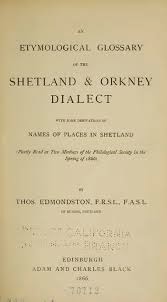Dialects! I love them. But sometimes dialects get a bad rap by those who draw a sharp line between dialects and languages. Dialects are variations in language. A noted modern linguist, John McWhorter, suggests that all we truly have are dialects, because everyone speaks a dialect of some type. But our natural tendency is to think that our own dialect is much superior to everyone else's,
 |
| English Dialects |
I began thinking about dialects while watching our recent favorite Netflix series, "Republic of Doyle," which is set in St. John's, Newfoundland. I am a sucker for anything filmed in a foreign location. This series has not disappointed me, with its seaside location and brightly colored buildings. But the most intriguing cultural element has been the use of an English St. John's dialect by certain characters in the episodes. (Well, one of the main characters, the private investigator Jack Doyle, is fairly intriguing even when he isn't speaking, I must admit.)
 |
| Jake Doyle |
I began noticing that the series characters have a slightly different twist on the English language in certain situations. For example, Malachy, Jake's father and fellow private investigator, sometimes uses the objective pronoun "me" in place of the possessive pronoun "my" (as in "I lost me cell phone") when speaking informally, mostly to other family members.
 |
| Malachy Doyle |
And I kept hearing a word at the end of their sentences that sounded like "boy." Closed captioning transcribed the word as "b'y," and I heard it used to refer to both sexes. The word "dude" seems to be an American equivalent, being used for both sexes as well.
A recent story line on the series has a policewoman, Leslie Bennett, (and romantic interest for Jake) going undercover to catch a drug dealer.
 |
| Leslie Bennett |
This clean cut, serious office of the law, changes her appearance dramatically to fit the character. She begins working in a bar, living in a small, messy apartment, and dressing in a provocative manner, using lots of makeup. But most interesting of all, Leslie adapts her language to fit the undercover character. The most noticeable element of Leslie's language change is her constant addition of "s" on the end of all of her present tense verbs. "I knows how we can meet Mr. Big." brags Leslie.
The Newfoundland dialect is much more complex than is depicted on the Netflix series, containing elements of, among other languages, Irish, West Country English, and French. The writers of the series have selected a more standard Canadian accent with a few elements of the local dialect thrown in for authenticity. I am grateful for that decision, because I would have a hard time with understanding if the series language were like the following:
Often the label of dialect is pinned on a language as a pejorative term, meaning "my language variety is better than your language variety." But I view dialects as an essential element to express cultural identity. In last night's episode of "Republic of Doyle," a visitor to St. John's was trying to act cool by saying something like, "How about a pint, b'y?" Jake replied, "You can't use b'y. You aren't from St. John's."




